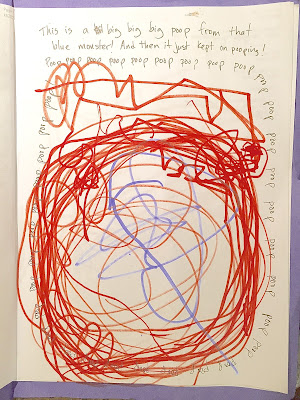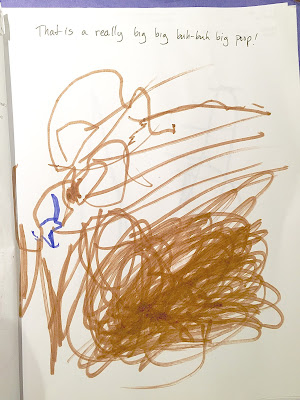"Once upon a time there was a
big monster who pooped
everywhere. And he was
called POOP MONSTER!
But he just kept on
pooping. Poop, poop, poop
Poop, poop, poop, poop
Poop, poop, poop, poop.
Poop.
Poop.
Poop."
And that is exactly what I wrote. But, of course, the act of converting her spoken words into the phonetic alphabet is not an exact translation. She was performing this story orally, evoking words, and particularly one word, more in the manner of an incantation than literature.
"Poop," she said, over and over. She knew from experience that the destiny of this story was to be read in front of her classmates. Her conspiratorial grin told me that she knew that word, the sounds she was repeatedly forming, would evoke peals of laughter from the other children, like magic. And she likewise knew that saying it frequently and louder (which I tried to indicate here by using all capital letters) would do nothing but increase her power to bring laughter into the world.

In his book Götternamen (The Names of Gods), German scholar Hermann Usener introduced the concept of "momentary deity," which is how he referred to those images which are born from the need or the specific feeling of a critical moment. In pre-literate societies (meaning those in which the phonetic alphabet is unknown, like a preschool classroom) words themselves serve as deities, summoned to serve a purpose in the world. These momentary gods are more than mere words, but active forces because they exist as sound in the world, real things that cause real impact, as opposed to written words which are merely visual representations of things that exist rather than the things themselves.
"This is a big, big poop from that
blue monster! And then it just kept on pooping!
Poop, poop, poop, poop, poop, poop, poop, poop, poop, poop, poop, poop, poop, poop, poop, poop . . .
The words "This" and "that" refer to the picture she had drawn. They are housekeeping deities, but the word "poop," repeated and amplified by the staccato, "big, big" is an evocation of hilarity and she knew it. That, not linear narrative, was clearly her point, a point that would be fully understood in any society that has not been fully worked over by the phonetic alphabet (of which there are very few these days). Of course, in evoking this momentary deity, she also knew that she risked creating disgust and scorn in at least some adults, but that, as a girl prone to cheekiness, was likely also part of what she intended to summon with her magical words.
"This is a really big, big, buh-buh big poop!
Her incantation complete, she said, "The end," bringing it to a close just as she had begun her story with the convention of "Once upon a time . . ." her only two nods to the phonetic alphabet. My transcription into letters on a page makes it look like she stammered, when in fact, what she was really doing was summoning the greatest gods she could muster: the "big, big, buh-buh big" ones. (Interestingly, when we attempt to translate pictographic writing like Egyptian hieroglyphs or Chinese pictograms into phonetic alphabet writing, it often comes off as stuttering.)
This all would have been easily understood, intuitively, by our hunter-gatherer ancestors because they, like preschoolers, had not yet been transformed by phonetic alphabet literacy. Indeed, in young children, as in the study of indigenous cultures, we find a non-linear understanding of the universe that jibes best with most of human history. In a time in which education policymakers are doubling down on "literacy" as we know it, there are many, like Marshall McLuhan, who believe that the advent of our global connectedness through electronic technology, has made us a "global village" and that the era of the phonetic alphabet is rapidly (in an historic sense) on the wane. The children we teach are already becoming literate in the new technologies in ways beyond the abstraction of the phonetic alphabet: literate in ways that would have been familiar to our ancestors. And their children and grandchildren may well come to view our current narrow, linear view of literacy as outmoded technology.

I'm reminded of the time I was asked to tell stories to a group of non-English speaking preschoolers. Despite not understanding the specific meaning of the words I was using, they laughed when English-speaking children would typically laugh. They raised their eyebrows at the moments when English-speakers typically would show surprise. Their shouts, sighs, interjections, and exclamations came at the same moments as those of their English speaking peers. The fact that they wanted me to repeat the story shocked me: that they then were able to more or less repeat the story to me in their own language seemed impossible. Certainly, they understood some English, but their teacher assured me they didn't. I know now what happened. They weren't responding to a written story, but rather an oral one. I had without knowing it brought forth momentary deities that spoke directly, from the real world, to their pre-literate minds.
Even the very concept of "progress" that makes us think that we are so much more "advanced" than our ancestors, comes from our use of the technology of the phonetic alphabet, which broke the magic of oral language into meaningless sounds, removing it from direct experience, putting it on a page, strung together in a line from beginning to end, divorced from their real impact on the world.
It's not clear that we are more advanced than prior generations. The only thing we do know is that we are different. Our youngest children, however, are a lens into what we were before the ancient Greeks adopted the Phoenician alphabet and were for the first time able to separate thought and action. They may also give us a view into the future of our species as physicists and philosophers have come around to the recognition that it is only our written word, not the universe itself, that is linear.

As educators, our role is to seek first to understand the children in our lives, as they are right now. And right now they are a pre-literate society. What they have to teach us about our past, present and future is profound, if only we would forget about the imperatives of progress (or "school readiness" in our common parlance) and strive to appreciate who they are rather than who we want them to be. To do that, we must take their poop monsters seriously, even if they, thankfully, are not to be taken literally.
******